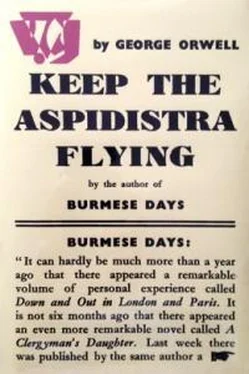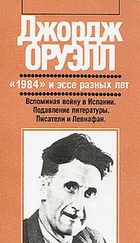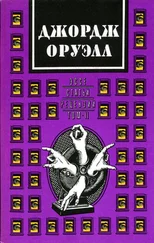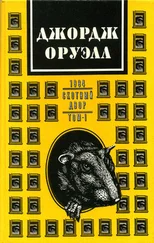Gordon came round the corner, turning over in his mind a line from London Pleasures. And then suddenly he stopped short. There was something wrong about the look of the Dorings' gate. What was it? Ah, of course! There were no cars waiting outside.
He paused, walked on a step or two, and stopped again, like a dog that smells danger. It was all wrong. There OUGHT to be some cars. There were always quite a lot of people at the Dorings' parties, and half of them came in cars. Why had nobody else arrived? Could he be too early? But no! They had said half past three and it was at least twenty to four.
He hastened towards the gate. Already he felt practically sure that the party HAD been put off. A chill like the shadow of a cloud had fallen across him. Suppose the Dorings weren't at home! Suppose the party had been put off! And this thought, though it dismayed him, did not strike him as in the least improbable. It was his special bugbear, the especial childish dread he carried about with him, to be invited to people's houses and then find them not at home. Even when there was no doubt about the invitation he always half expected that there would be some hitch or other. He was never quite certain of his welcome. He took it for granted that people would snub him and forget about him. Why not, indeed? He had no money. When you have no money your life is one long series of snubs.
He swung the iron gate open. It creaked with a lonely sound. The dank mossy path was bordered with chunks of some Rackhamesque pinkish stone. Gordon inspected the house–front narrowly. He was so used to this kind of thing. He had developed a sort of Sherlock Holmes technique for finding out whether a house was inhabited or not. Ah! Not much doubt about it this time. The house had a deserted look. No smoke coming from the chimneys, no windows lighted. It must be getting darkish indoors—surely they would have lighted the lamps? And there was not a single footmark on the steps; that settled it. Nevertheless with a sort of desperate hope he tugged at the bell. An old–fashioned wire bell, of course. In Coleridge Grove it would have been considered low and unliterary to have an electric bell.
Clang, clang, clang! went the bell.
Gordon's last hope vanished. No mistaking the hollow clangour of a bell echoing through an empty house. He seized the handle again and gave it a wrench that almost broke the wire. A frightful, clamorous peal answered him. But it was useless, quite useless. Not a foot stirred within. Even the servants were out. At this moment he became aware of a lace cap, some dark hair, and a pair of youthful eyes regarding him furtively from the basement of the house next door. It was a servant–girl who had come out to see what all the noise was about. She caught his eye and gazed into the middle distance. He looked a fool and knew it. One always does look a fool when one rings the bell of an empty house. And suddenly it came to him that that girl knew all about him—knew that the party had been put off and that everyone except Gordon had been told of it—knew that it was because he had no money that he wasn't worth the trouble of telling. SHE knew. Servants always know.
He turned and made for the gate. Under the servant's eye he had to stroll casually away, as though this were a small disappointment that scarcely mattered. But he was trembling so with anger that it was difficult to control his movements. The sods! The bloody sods! To have played a trick like that on him! To have invited him, and then changed the day and not even bothered to tell him! There might be other explanations—he just refused to think of them. The sods, the bloody sods! His eye fell upon one of the Rackhamesque chunks of stone. How he'd love to pick that thing up and bash it through the window! He grasped the rusty gate–bar so hard that he hurt his hand and almost tore it. The physical pain did him good. It counteracted the agony at his heart. It was not merely that he had been cheated of an evening spent in human company, though that was much. It was the feeling of helplessness, of insignificance, of being set aside, ignored—a creature not worth worrying about. They'd changed the day and hadn't even bothered to tell him. Told everybody else, but not him. That's how people treat you when you've no money! Just wantonly, cold– bloodedly insult you. It was likely enough, indeed, that the Dorings' had honestly forgotten, meaning no harm; it was even possible that he himself had mistaken the date. But no! He wouldn't think of it. The Dorings' had done it on purpose. Of COURSE they had done it on purpose! Just hadn't troubled to tell him, because he had no money and consequently didn't matter. The sods!
He walked rapidly away. There was a sharp pain in his breast. Human contact, human voices! But what was the good of wishing? He'd have to spend the evening alone, as usual. His friends were so few and lived so far away. Rosemary would still be at work; besides, she lived at the back of beyond, in West Kensington, in a women's hostel guarded by female dragons. Ravelston lived nearer, in the Regent's Park district. But Ravelston was a rich man and had many engagements; the chances were always against his being at home. Gordon could not even ring him up, because he hadn't the necessary two pennies; only three halfpence and the Joey. Besides, how could he go and see Ravelston when he had no money? Ravelston would be sure to say 'Let's go to a pub,' or something! He couldn't let Ravelston pay for his drinks. His friendship with Ravelston was only possible on the understanding that he paid his share of everything.
He took out his single cigarette and lighted it. It gave him no pleasure to smoke, walking fast; it was a mere reckless gesture. He did not take much notice of where he was going. All he wanted was to tire himself, to walk and walk till the stupid physical fatigue had obliterated the Dorings' snub. He moved roughly southward—through the wastes of Camden Town, down Tottenham Court Road. It had been dark for some time now. He crossed Oxford Street, threaded through Covent Garden, found himself in the Strand, and crossed the river by Waterloo Bridge. With night the cold had descended. As he walked his anger grew less violent, but his mood could not fundamentally improve. There was a thought that kept haunting him—a thought from which he fled, but which was not to be escaped. It was the thought of his poems. His empty, silly, futile poems! How could he ever have believed in them? To think that actually he had imagined, so short a time ago, that even London Pleasures might one day come to something! It made him sick to think of his poems now. It was like remembering last night's debauch. He knew in his bones that he was no good and his poems were no good. London Pleasures would never be finished. If he lived to be a thousand he would never write a line worth reading. Over and over, in self–hatred, he repeated those four stanzas of the poem he had been making up. Christ, what tripe! Rhyme to rhyme—tinkle, tinkle, tinkle! Hollow as an empty biscuit tin. THAT was the kind of muck he had wasted his life on.
He had walked a long way, five or seven miles perhaps. His feet were hot and swollen from the pavements. He was somewhere in Lambeth, in a slummy quarter where the narrow, puddled street plunged into blackness at fifty yards' distance. The few lamps, mist–ringed, hung like isolated stars, illumining nothing save themselves. He was getting devilishly hungry. The coffee–shops tempted him with their steamy windows and their chalked signs: 'Good Cup of Tea, 2d. No Urns Used.' But it was no use, he couldn't spend his Joey. He went under some echoing railway arches and up the alley on to Hungerford Bridge. On the miry water, lit by the glare of skysigns, the muck of East London was racing inland. Corks, lemons, barrel–staves, a dead dog, hunks of bread. Gordon walked along the Embankment to Westminster. The wind made the plane trees rattle. Sharply the menacing wind sweeps over. He winced. That tripe again! Even now, though it was December, a few poor draggled old wrecks were settling down on the benches, tucking themselves up in sort of parcels of newspaper. Gordon looked at them callously. On the bum, they called it. He would come to it himself some day. Better so, perhaps? He never felt any pity for the genuine poor. It is the black–coated poor, the middle–middle class, who need pitying.
Читать дальше








